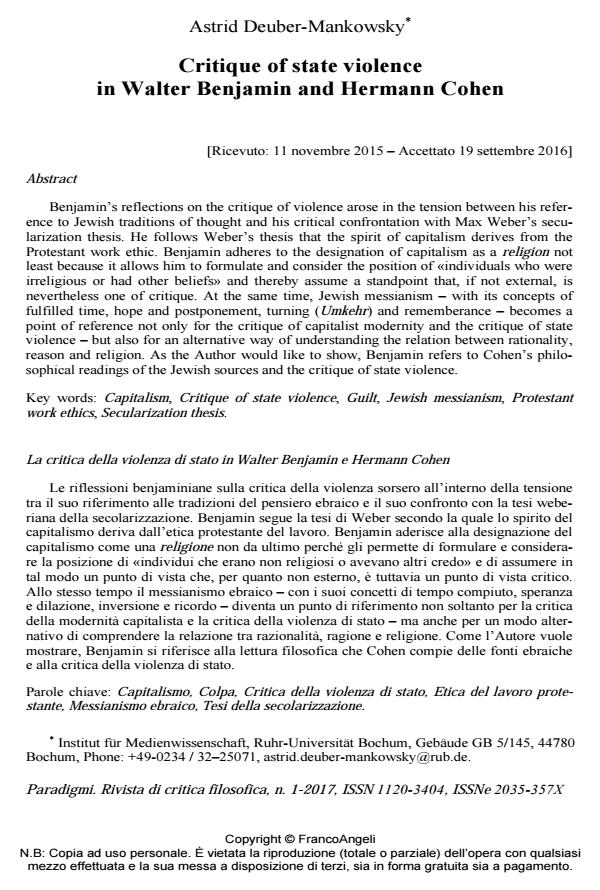Critique of state violence in Walter Benjamin and Hermann Cohen
Titolo Rivista PARADIGMI
Autori/Curatori Astrid Deuber-Mankowsky
Anno di pubblicazione 2017 Fascicolo 2017/1 Lingua Inglese
Numero pagine 15 P. 113-127 Dimensione file 208 KB
DOI 10.3280/PARA2017-001008
Il DOI è il codice a barre della proprietà intellettuale: per saperne di più
clicca qui
Qui sotto puoi vedere in anteprima la prima pagina di questo articolo.
Se questo articolo ti interessa, lo puoi acquistare (e scaricare in formato pdf) seguendo le facili indicazioni per acquistare il download credit. Acquista Download Credits per scaricare questo Articolo in formato PDF

FrancoAngeli è membro della Publishers International Linking Association, Inc (PILA)associazione indipendente e non profit per facilitare (attraverso i servizi tecnologici implementati da CrossRef.org) l’accesso degli studiosi ai contenuti digitali nelle pubblicazioni professionali e scientifiche
Benjamin’s reflections on the critique of violence arose in the tension between his reference to Jewish traditions of thought and his critical confrontation with Max Weber’s secularization thesis. He follows Weber’s thesis that the spirit of capitalism derives from the Protestant work ethic. Benjamin adheres to the designation of capitalism as a religion not least because it allows him to formulate and consider the position of «individuals who were irreligious or had other beliefs» and thereby assume a standpoint that, if not external, is nevertheless one of critique. At the same time, Jewish messianism - with its concepts of fulfilled time, hope and postponement, turning (Umkehr) and rememberance - becomes a point of reference not only for the critique of capitalist modernity and the critique of state violence - but also for an alternative way of understanding the relation between rationality, reason and religion. As the Author would like to show, Benjamin refers to Cohen’s philosophical readings of the Jewish sources and the critique of state violence.
Le riflessioni benjaminiane sulla critica della violenza sorsero all’interno della tensione tra il suo riferimento alle tradizioni del pensiero ebraico e il suo confronto con la tesi weberiana della secolarizzazione. Benjamin segue la tesi di Weber secondo la quale lo spirito del capitalismo deriva dall’etica protestante del lavoro. Benjamin aderisce alla designazione del capitalismo come una religione non da ultimo perché gli permette di formulare e considerare la posizione di «individui che erano non religiosi o avevano altri credo» e di assumere in tal modo un punto di vista che, per quanto non esterno, è tuttavia un punto di vista critico. Allo stesso tempo il messianismo ebraico - con i suoi concetti di tempo compiuto, speranza e dilazione, inversione e ricordo - diventa un punto di riferimento non soltanto per la critica della modernità capitalista e la critica della violenza di stato - ma anche per un modo alternativo di comprendere la relazione tra razionalità, ragione e religione. Come l’Autore vuole mostrare, Benjamin si riferisce alla lettura filosofica che Cohen compie delle fonti ebraiche e alla critica della violenza di stato.
Keywords:Capitalismo, Colpa, Critica della violenza di stato, Etica del lavoro protestante, Messianismo ebraico, Tesi della secolarizzazione.
- Benjamin W. (1991). Das Passagen-Werk. Aufzeichnungen und Materialien, J75,2. In: Tiedemann R., ed., GS V, I. Frankfurt a. M.: Suhrkamp Verlag: 455-456.
- Benjamin W. (1996). Capitalism as Religion. In: Bullock M., Jennings M.W., eds., SW I. Cambridge, MA: Belknap Press: 288-291.
- Benjamin W. (1996a). Critique of Violence. In: Bullock M., Jennings M.W., eds., SW I. Cambridge, MA: Belknap Press: 236-252.
- Benjamin W. (1999). Franz Kafka. On the Tenth Anniversary of his Death. In: Jennings M.W., Eiland H. and Smith G., eds., SW II. 2. Cambridge, MA: Belknap Press: 794-818.
- Benjamin W. (2002). Theological-political Fragment. In: Jennings M.W. and Eiland H., eds., SW III. Cambridge, MA: Belknap Press: 305-306.
- Benjamin W. (2003). On the Concept of History. In: Jennings M.W. and Eiland H., eds., SW IV. Cambridge, MA: Belknap Press: 401-424.
- Butler J. (1997). Excitable Speech: A Politics of the Performative. New York: Routledge.
- Butler J. (2006). Critique, Coercion, and Sacred Life in Benjamin's “Critique of Violence”. In: de Vries H. and Sullivan L.E., eds., Political Theologies: Public Religions in a Post-secular World. New York: Fordham University Press: 201-219.
- Cohen H. (1977). Ethik des reinen Willens. In: Holzhey H. et al., eds., Werke, vol. VII. Hildesheim: Georg Olms Verlag.
- Cohen H. (1995 a). Religion der Vernunft aus den Quellen des Judentums. Eine jüdische Religionsphilosophie. Nach dem Manuskript des Verfassers neu durchgearbeitet und mit einem Nachwort versehen von B. Strauß. Wiesbaden: Fourier.
- Fenves P. (2011). The Messianic Reduction: Walter Benjamin and the Shape of Time. Stanford, CA.: Stanford University Press.
- Habermas J. (1992). Faktizität und Geltung. Beiträge zur Diskurstheorie des Rechts und des demokratischen Rechtsstaats. Frankfurt a. M.: Suhrkamp Verlag.
- Holzhey H. (1994). Neukantianismus und Sozialismus. Einleitung. In: Holzhey H., ed., Ethischer Sozialismus. Zur politischen Philosophie des Neukantianismus. Frankfurt a. M.: Suhrkamp Verlag: 7-34.
- Kant I. (1977). Zum ewigen Frieden. In: Weischedel W., ed. Werkausgabe, vol. XI, Schriften zur Anthropologie, Geschichtsphilosophie, Politik und Pädagogik I. Frankfurt a. M.: Suhrkamp Verlag: 195-251.
- Löwy M. (2009). Capitalism as Religion: Walter Benjamin and Max Weber. Historical Materialism, 17: 60-73,
- Scholem G. (1975). Walter Benjamin: Die Geschichte einer Freundschaft. Frankfurt a. M.: Suhrkamp Verlag.
- Weber M. (1920). Gesammelte Aufsätze zur Religionssoziologie. Bd. I. Tübingen: Mohr Siebeck Verlag.
- Weber M. (1930). The Protestant Ethic and the Spirit of Capitalism. New York: Charles Scribner’s Sons (Engl. transl. by T. Parsons).
Astrid Deuber-Mankowsky, Critique of state violence in Walter Benjamin and Hermann Cohen in "PARADIGMI" 1/2017, pp 113-127, DOI: 10.3280/PARA2017-001008